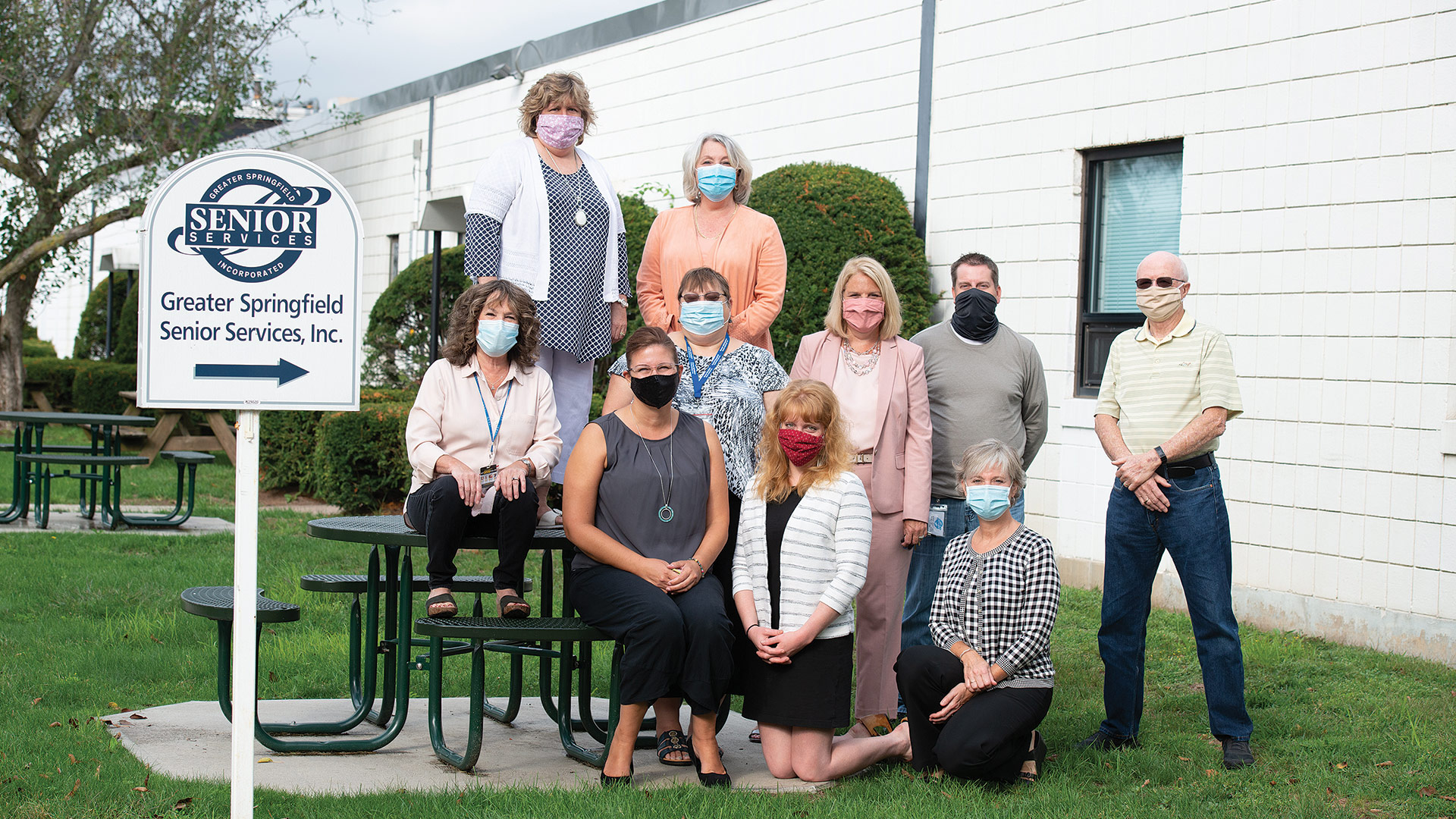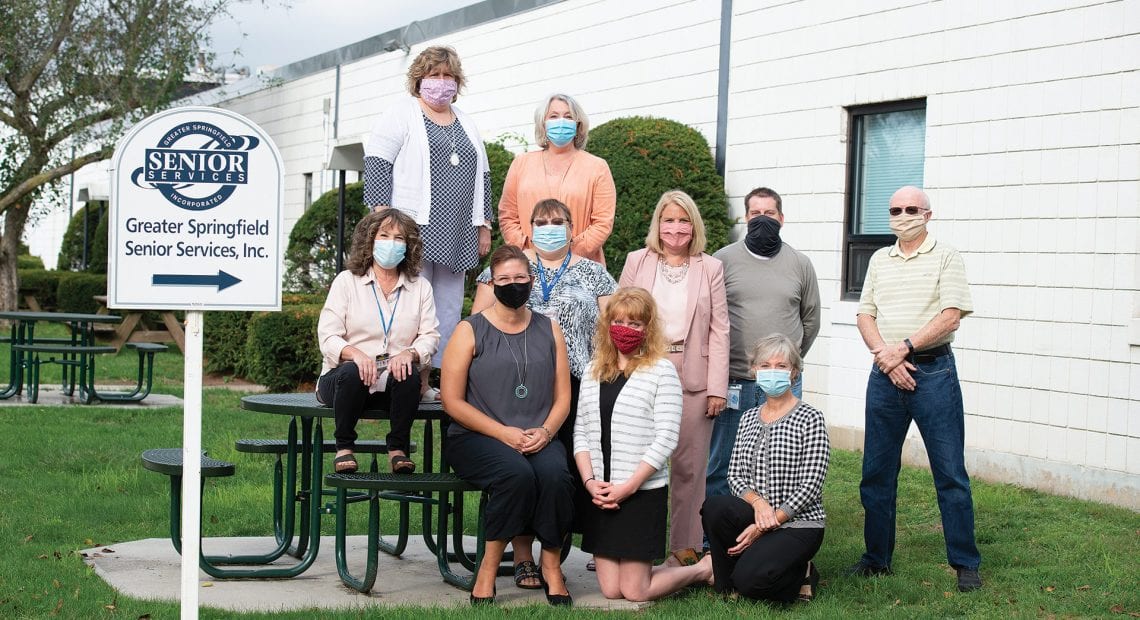Dedicated Team Rose to the Occasion and Took Care of Those in Need

The Nutrition Department at GSSSI
Several areas at the Greater Springfield Senior Services Inc. facility on Industry Avenue in Springfield are still sporting St. Patrick’s Day decorations.
They were put up early last March, and they remain there … well, because those who put them up haven’t been back to take them down.
Indeed, as the pandemic closed in and the state-ordered shutdown went into effect just before that holiday, the vast majority of GSSSI’s 250 employees began working remotely — and they have remained off site. But for some, working at home simply wasn’t an option. That’s because it’s their job to essentially provide nutritious home-delivered meals, or HDMs, as they call them, each day.
This small team of 10 essential employees stayed on and weathered the storm, if you will, and devised and executed a comprehensive plan to ensure those who need these meals get them, even though the senior-dining sites that were in operation had to shut down due to restrictions on large gatherings, and all meals have to be delivered to the home or picked up at designated ‘grab-and-go’ sites.
The creation of that new grab-and-go program underscores just how quickly — and effectively — the Nutrition Department at GSSSI was able to respond to this crisis situation.
“We knew we couldn’t leave people behind. There were people in need, and we had to come up with a plan to get them their meals.”
Indeed, the initiative involved everything from securing new caterers, including one that could prepare medically tailored meals, to establishing the sites; from partnering with the PVTA to deliver the meals to putting in place the protocols needed to ensure that meals were picked up safely.
Doing all that might normally take four to six weeks, said Heather Jolicoeur, community coordinator for GSSSI and a member of that team. Instead, they did it all in under two weeks.
All that sounds difficult enough, but remember, this was carried out in the middle of a pandemic, so there additional challenges and assignments on top of those one might expect:
• One of the food resources was shut down due to COVID-19, forcing those at GSSSI to track down a reliable and appropriate food source for Kosher meal recipients;
• A corps of volunteers had to be assembled, with CORI checks run on each individual due to the nature of the work;
• Temporary Meals on Wheels drivers had to be hired to fill in for regular drivers who had pre-existing conditions and couldn’t safely deliver meals every day;
• New policies for delivering meals with the least amount of contact from the drivers were put in place, further complicating the process; and
• As the crisis continued, new needs emerged, and HDM recipients were soon also receiving toilet paper, hand sanitizer, and other items, supplied by those in ‘chase cars’ following those delivering meals.
Jill Keough
“Each one of us felt very responsible about whom we were serving‚ and we were responsible to one another. So we really took social distancing very seriously. Many of us didn’t go to the supermarket for months because we didn’t want to risk bringing the virus into work.”
“Every day, there are emergencies; every day, the conditions change; every day, new policies and procedures are developed, implemented, and changed,” said Jolicoeur, putting the accent on the present tense. “Every day, all 10 of us work together calmly and focused on serving as many seniors as possible.”
As they talked about their experiences and what it meant to be part of this effort, those who are involved gave some unique perspective on all that has transpired over the past seven months, and underscored why this group is part of the Healthcare Heroes class of 2020.
“We knew we couldn’t leave people behind,” said Jill Keough, executive director of GSSSI, as she summed up the situation that unfolded in mid-March and the Nutrition Department’s detailed, and imaginative, response to the problem — or problems, to be precise. “There were people in need, and we had to come up with a plan to get them their meals.”
Before getting to this plan, though, Mary Jenewin Caplin, the now-retired Area Agency on Aging director, set the stage. Before COVID-19, she explained, GSSSI served more than 900 clients who rely on HMDs each day. Prepared by caterers each day, the meals were delivered to some homes, but also to 14 senior-dining sites across the region, where clients could not only dine, but enjoy one another’s company and camaraderie.
When the pandemic struck, those dining sites had to close, for obvious reasons, but the need remained, and now, meals had to be delivered to the home, requiring the hiring of more volunteer drivers and new ways to get meals into the hands of those who needed them.
The plan that emerged came together very quickly, out of necessity, said Mike Young, an HMD supervisor, and it would have to incorporate a number of changes to how things had been done, but could no longer be done in the age of COVID.
“The biggest concern was that clients didn’t even want to open their doors anymore,” he explained. “We had to worry about how we would see them, how we would get them the meals, how would we keep the clients safe, how would we keep the drivers safe. Our drivers were used to going into someone’s house, putting the meal in the refrigerator, giving it to them on the couch, or putting it on the kitchen table. Now, we’re trying to get a driver to give them a meal, stay six feet apart, and maybe not even have the door open; there were a number of challenges to overcome.”
“None of the drivers could fit all that food into one car. We had some people call and say, ‘stop, I have no more freezer space”
Tracy Landry, another HMD supervisor, agreed, noting that, to keep both drivers and clients safe, a series of new protocols were put in place, including single-use plastic bags for deliveries, masks, hand sanitizer, and other steps.
“We had more meetings than you can imagine when we first this started,” she recalled. “Every day was different, and each day it seemed that there was a new challenge.”
Indeed, and as new challenges emerged, this small but dedicated team found ways to meet them. At the top of the list of challenges was keeping everyone safe, and for this team of 10, that meant taking extraordinary measures themselves.
“Each one of us felt very responsible about whom we were serving‚ and we were responsible to one another,” said Keough. “So we really took social distancing very seriously. Many of us didn’t go to the supermarket for months because we didn’t want to risk bringing the virus into work.”
As noted, one of the real concerns for the Nutrition Department team was keeping the drivers — most all of them older and in the high-risk category — out of harm’s way.
“My concern the whole time was the drivers — they’re all in that danger zone,” Young said. “Every day, they were asking, ‘what’s going on?’ You could tell they were concerned, and I was concerned for them. The last thing I wanted to see was someone catch something. To me, they’re the real heroes in this; they were out there every day doing it.”
At the height of the crisis, additional volunteer drivers had to be hired to handle what became larger deliveries, said Landry, noting that those at GSSSI were determined to help seniors stock up on frozen meals to make sure they had enough food in the home.
“None of the drivers could fit all that food into one car,” she explained, adding quickly that these efforts to help clients stock up were more than successful. “We had some people call and say, ‘stop, I have no more freezer space.’”
And, as noted, the help being provided soon extended beyond food. Indeed, as calls came in from the public asking how they could volunteer and help serve the seniors, some were pressed into service following the food-delivery vehicles in so-called chase cars stockpiled with toilet paper, hand sanitizer, and other items the client might need.
But food was the primary focus, said Kate Senn, Nutrition program director, adding that the creation of a grab-and-go program certainly helped GSSSI effectively meet that growing need. To put the matter in perspective, she noted that, in January, prior to COVID-19, GSSSI was providing 3,352 meals for congregate dining sites. In August, it was providing 4,581 meals via the grab-and-go program.
Those numbers help tell the story, but only a little. The tireless work and dedication to serving clients — while also keeping everyone safe at a time when similar programs in other states and other parts of this state had to shut down because of positive cases — are what really make this story happen.
The 10 that stayed behind have left the St. Patrick’s Day decorations up, perhaps thinking they will be appropriate in a few months again anyway. But more to the point, they just haven’t had any time.
They’ve been too busy getting HDMs to all those who need them. They’ve been too busy doing the work of true Healthcare Heroes.
George O’Brien can be reached at [email protected]







